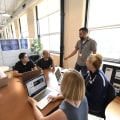As an expert in the field of education, I have had the opportunity to observe and analyze the teaching methods used at various learning centers in southern New Hampshire. In this article, I will delve into the different teaching methodologies used at these centers and their effectiveness.
The Importance of Teaching Methodology
Teaching methodology refers to the strategies and techniques used by educators to impart knowledge and skills to their students. It is not a one-size-fits-all approach, as different students have different learning styles and needs. Effective teaching methodology can make a significant difference in a student's academic performance and overall learning experience. It can also help students develop critical thinking skills, problem-solving abilities, and foster a love for learning.The Traditional Approach
The traditional approach to teaching involves a teacher standing in front of a classroom, delivering lectures and assigning homework for students to complete at home.While this method may work for some students, it can be quite challenging for others. The traditional approach relies heavily on rote memorization and does not cater to individual learning styles. It also does not encourage active participation from students, which can lead to disengagement and lack of interest in the subject.
The Montessori Method
The Montessori Method is a child-centered approach to education that focuses on hands-on learning and self-directed activities. This method was developed by Dr.Maria Montessori in the early 1900s and has gained popularity in recent years. In southern New Hampshire, there are several learning centers that follow the Montessori Method. These centers provide a prepared environment where students can explore and learn at their own pace. The teacher's role is to observe and guide students, rather than instructing them directly. The Montessori Method has been praised for its ability to foster independence, creativity, and critical thinking skills in students. It also allows for a more personalized learning experience, as students are encouraged to pursue their interests and passions.
The Project-Based Learning Approach
Project-based learning (PBL) is an approach that involves students working on a project or problem over an extended period of time.This method is often used in STEM (science, technology, engineering, and math) subjects but can be applied to other areas of study as well. In southern New Hampshire, there are learning centers that specialize in PBL. These centers provide students with real-world problems or scenarios to solve, allowing them to apply their knowledge and skills in a practical setting. PBL has been proven to be an effective teaching methodology as it promotes collaboration, critical thinking, and problem-solving skills. It also allows for a more hands-on learning experience, which can be beneficial for students who struggle with traditional classroom settings.
The Flipped Classroom Approach
The flipped classroom approach involves students watching lectures or completing readings at home and then using class time for discussions, activities, and projects. In southern New Hampshire, there are learning centers that have adopted this approach. The flipped classroom approach has been praised for its ability to cater to different learning styles and promote self-directed learning.However, it does require students to be self-motivated and disciplined in completing their at-home assignments.
The Effectiveness of Different Teaching Methodologies
After observing and analyzing the different teaching methodologies used at learning centers in southern New Hampshire, it is clear that there is no one "best" approach. Each method has its strengths and weaknesses, and what works for one student may not work for another. However, it is essential to note that the effectiveness of a teaching methodology also depends on the teacher's skills and abilities. A skilled teacher can adapt their teaching style to cater to different students' needs and make any teaching methodology more effective.Conclusion
In conclusion, learning centers in southern New Hampshire use a variety of teaching methodologies to cater to their students' diverse needs. From the traditional approach to the Montessori Method, each method has its benefits and limitations.As an expert in education, I believe that a combination of different teaching methodologies can be the most effective in providing a well-rounded education for students.



